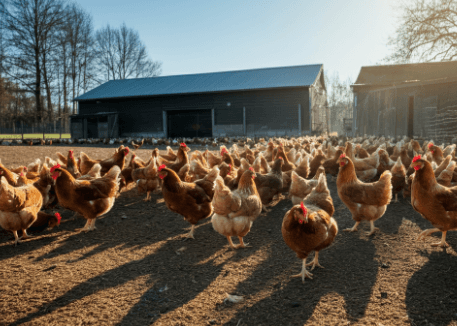Embarking on a new venture brings excitement and challenges, especially when you start a chicken farm on land in Florida. The Sunshine State provides a distinctive blend of weather conditions and assets, making it an ideal location for poultry farming. Whether you want to embark on a small-scale hobby farm or establish a more extensive commercial operation, understanding the specific requirements to start a chicken farm on land in Florida is crucial for your success. Read on as we walk you through the essential steps, from selecting the right breed to complying with local regulations, so you can turn your vision into a thriving reality.
Experienced real estate investors like Steve Daria and Joleigh emphasize the importance of choosing the right location when starting a chicken farm in Florida. Their expertise suggests prospective farmers focus on properties with ample space, quality soil, and access to fresh water. Taking these factors into account, you have the chance to lay a robust groundwork for your poultry farming endeavor.
Why Start a Chicken Farm on Land in Florida?
If you want to start a chicken farm on land in Florida, you’re in the right place.
The Sunshine State’s warm climate and abundant land make it an ideal location for raising poultry.
The consistent weather conditions allow for year-round farming, reducing the risks associated with extreme weather changes that can affect the health and produce of your flock.

Chicken farming can provide a steady income through the sale of eggs, meat, and even organic fertilizers derived from chicken manure.
1. Understanding Local Regulations
Before you start a chicken farm on land in Florida, it’s crucial to understand the local regulations.
Different counties and cities have specific zoning laws and permits required for operating a poultry farm.
Check Zoning Laws
Before starting a chicken farm on land in Florida, it’s crucial to verify that your land is zoned for agricultural activities.
Zoning laws can vary widely across different counties and municipalities in Florida, and agricultural zoning typically allows for livestock operations like chicken farming.
Checking zoning regulations ensures that you can legally operate your farm without running into issues related to land use violations.
Get Necessary Permits
Operating a chicken farm in Florida requires various permits and licenses, depending on your area and the scale of your operations.
These permits typically include environmental permits for waste management and water use, as well as agricultural documents that ensure compliance with health and safety regulations.
Applying for these permits ensures that your chicken farm meets all legal requirements and operates within the framework of state and local regulations.
Be prepared to provide detailed plans of your farm layout, waste management systems, and biosecurity measures as part of the permit application process.
Adhere to Health Regulations
Ensuring the well-being and care of your chickens is crucial for the prosperity and longevity of your farm.
Florida follows state and federal health regulations that govern poultry farming practices, including disease prevention, biosecurity measures, and veterinary care requirements.
Adhering to these regulations not only protects your chickens from diseases but also ensures the safety of consumers if you plan to sell eggs or meat.
Regular inspections and adherence to vaccination schedules are essential components of maintaining compliance with health regulations on your chicken farm.
Get Started: Get Your Cash Offer Below…
We are direct land buyers. There are no commissions or fees and no obligation whatsoever. Start below by sharing where your property is and where we can send your offer…
2. Choosing the Right Location
Selecting the right location to start a chicken farm on land in Florida is essential to its success.
Consider factors like accessibility, water sources, and proximity to markets when choosing your land.
- Accessibility: Ensure easy access to transport supplies and products.
- Water Sources: Secure a reliable water source for your chickens.
- Proximity to Markets: Being close to markets can reduce transportation costs and increase profitability.
3. Selecting Chicken Breeds
Choosing the right chicken breeds is key to a successful chicken farm on land in Florida.
Different breeds have varying needs and production capabilities.
- Egg-Laying Breeds: Consider breeds like Leghorns or Rhode Island Reds for high egg production.
- Meat Breeds: Breeds like Cornish Cross are excellent for meat production.
- Dual-Purpose Breeds: Breeds like Plymouth Rock can provide both eggs and meat.
4. Building Your Chicken Coop
A well-built chicken coop is vital for the health and productivity of your chickens.
Here are some tips for constructing an efficient coop:
- Size and Space: Provide enough space for each chicken to move comfortably.
- Ventilation: Ensure correct ventilation to maintain air quality.
- Predator Protection: Reinforce the coop to protect chickens from predators.

5. Feeding and Nutrition
Correct nutrition is vital for the health and productivity of your chickens.
Here’s what you need to know about providing food for the flock:
- Balanced Diet: Give a balanced diet with the right mix of protein, carbohydrates, vitamins, and minerals.
- Clean Water: Ensure a stable supply of clean water.
- Supplements: Consider adding supplements to enhance health and productivity.
6. Managing Chicken Health
Keeping your chickens healthy is essential for a successful chicken farm on land in Florida.
Here are some strategies to manage chicken health:
- Regular Check-Ups: Conduct regular health check-ups to identify and address issues early.
- Vaccination: Vaccinate your chickens against common diseases.
- Clean Environment: Continue a clean living environment to avoid infections and diseases.
7. Marketing Your Products
Here are some tips to market your eggs and meat effectively:
- Local Markets: Sell your products at local farmers’ markets.
- Online Sales: Utilize online platforms to reach a broader audience.
- Branding: Develop a strong brand identity to attract and retain customers.
8. Financial Planning
Proper financial planning is vital to ensure the sustainability and growth of your chicken farm on land in Florida.
Here’s how to manage your finances effectively:
- Budgeting: Create a detailed budget covering all aspects of your farm operations.
- Funding: Explore funding options like loans, grants, and investments.
- Record-Keeping: Maintain accurate financial records to track expenses and revenue.
9. Sustainability Practices
Incorporating sustainability practices can benefit your farm and the environment.
Here are some sustainable practices to consider:
- Waste Management: Implement effective waste management operations.
- Renewable Energy: Contemplate using renewable energy sources like solar panels.
- Organic Farming: Adopt organic farming practices to improve soil health and reduce chemical use.
Conclusion
Starting a chicken farm on land in Florida is a promising venture with potential for profitability and sustainability. By understanding local regulations, choosing the right location and breeds, and implementing effective management practices, you can establish a thriving chicken farm.
**NOTICE: Please note that the content presented in this post is intended solely for informational and educational purposes. It should not be construed as legal or financial advice or relied upon as a replacement for consultation with a qualified attorney or CPA. For specific guidance on legal or financial matters, readers are encouraged to seek professional assistance from an attorney, CPA, or other appropriate professional regarding the subject matter.
